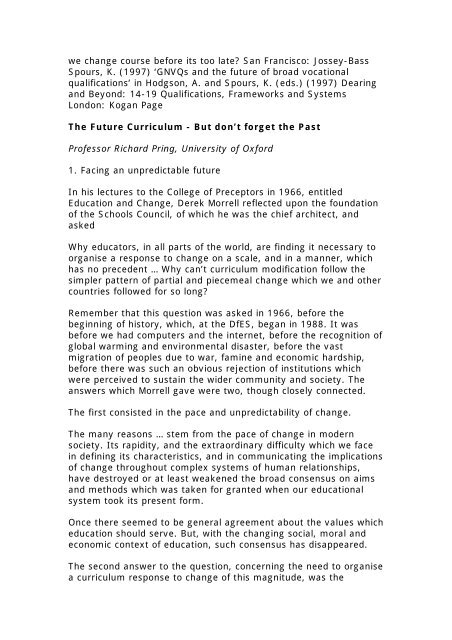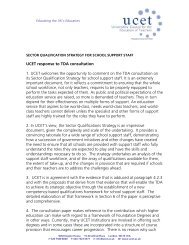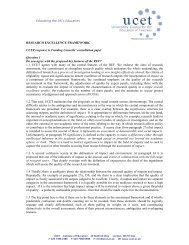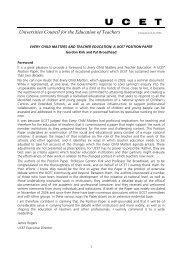The School Curriculum Ten Years Hence - UCET: Universities ...
The School Curriculum Ten Years Hence - UCET: Universities ...
The School Curriculum Ten Years Hence - UCET: Universities ...
You also want an ePaper? Increase the reach of your titles
YUMPU automatically turns print PDFs into web optimized ePapers that Google loves.
we change course before its too late? San Francisco: Jossey-Bass<br />
Spours, K. (1997) ‘GNVQs and the future of broad vocational<br />
qualifications’ in Hodgson, A. and Spours, K. (eds.) (1997) Dearing<br />
and Beyond: 14-19 Qualifications, Frameworks and Systems<br />
London: Kogan Page<br />
<strong>The</strong> Future <strong>Curriculum</strong> - But don’t forget the Past<br />
Professor Richard Pring, University of Oxford<br />
1. Facing an unpredictable future<br />
In his lectures to the College of Preceptors in 1966, entitled<br />
Education and Change, Derek Morrell reflected upon the foundation<br />
of the <strong>School</strong>s Council, of which he was the chief architect, and<br />
asked<br />
Why educators, in all parts of the world, are finding it necessary to<br />
organise a response to change on a scale, and in a manner, which<br />
has no precedent … Why can’t curriculum modification follow the<br />
simpler pattern of partial and piecemeal change which we and other<br />
countries followed for so long?<br />
Remember that this question was asked in 1966, before the<br />
beginning of history, which, at the DfES, began in 1988. It was<br />
before we had computers and the internet, before the recognition of<br />
global warming and environmental disaster, before the vast<br />
migration of peoples due to war, famine and economic hardship,<br />
before there was such an obvious rejection of institutions which<br />
were perceived to sustain the wider community and society. <strong>The</strong><br />
answers which Morrell gave were two, though closely connected.<br />
<strong>The</strong> first consisted in the pace and unpredictability of change.<br />
<strong>The</strong> many reasons … stem from the pace of change in modern<br />
society. Its rapidity, and the extraordinary difficulty which we face<br />
in defining its characteristics, and in communicating the implications<br />
of change throughout complex systems of human relationships,<br />
have destroyed or at least weakened the broad consensus on aims<br />
and methods which was taken for granted when our educational<br />
system took its present form.<br />
Once there seemed to be general agreement about the values which<br />
education should serve. But, with the changing social, moral and<br />
economic context of education, such consensus has disappeared.<br />
<strong>The</strong> second answer to the question, concerning the need to organise<br />
a curriculum response to change of this magnitude, was the






